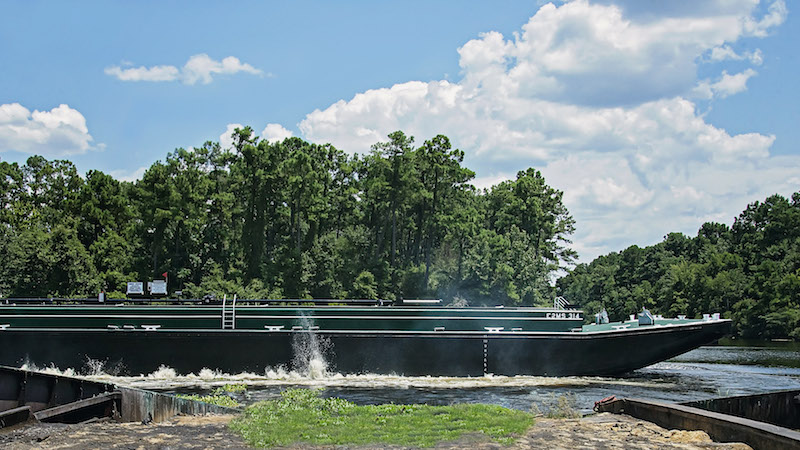Arcosa Inc., a provider of infrastructure-related products and solutions, announced results for the fourth quarter and full year yesterday. Its barge business, Arcosa Marine, a manufacturer of hopper, tank, and deck barges as well as fiberglass barge covers, saw revenues increase 114% compared to the prior period.
Among the fourth-quarter highlights:
• Revenues increased 19% to $446.9 million.
• Net income of $21.1 million, with diluted EPS of 43 cents.
• Adjusted EBITDA increased 17% to $53.1 million
• Operating cash flow of $139.8 million and free cash flow of $115.4 million
Full-year highlights:
• Revenues increased 19% to $1,736.9 million
• Net income of $113.3 million with Diluted EPS of $2.32 and Adjusted Diluted EPS of
$2.35
• Adjusted EBITDA increased 29% to $240.7 million
• Operating cash flow of $358.8 million and free cash flow of $273.4 million
Full-year results were helped by a barge market recovery with revenue growth that more than offset softness
in rail components, the company said
Based on its current portfolio of businesses, Dallas-based Arcosa expects full year 2020 revenues of
$1.95 billion to $2.1 billion, which represents year-over-year growth of 17% at the midpoint.
Adjusted EBITDA is expected to range from $275 million to $300 million, up 19% at the midpoint,
with approximately 55% of adjusted EBITDA expected to be generated in the second half of the
year, due primarily to the anticipated delivery schedules for the barge and wind tower businesses.
“Market conditions across our portfolio remain robust, with a few exceptions," Antonio Carrillo, president and CEO said in a statement. “We are experiencing positive demand for our construction products, barges, and utility
structures, which we expect to more than offset headwinds in our rail components business and lower pricing in our wind towers business."
Segment Results - Transportation Products:
• Fourth-quarter revenues increased 30% to $132.3 million, driven by a 114% increase in
barge revenues as the business successfully ramped up to meet the ongoing market recovery. This was partially offset by a 43% decline in components revenues due to continued expected softening in railcar demand.
• Approximately $15 million of barge revenues shifted into January 2020, causing fourth
quarter revenues to be below the company's expectations.
• Despite weaker component performance, adjusted segment EBITDA increased 12%
year-over-year to $19 million, representing a margin of 14.4%, as the barge market
continues to recover.
• Segment margin declined compared to the prior year level of 16.7%, as anticipated, but
improved 9% sequentially as the barge business delivered a higher volume of barges
taken in a stronger pricing environment.
• The barge business received orders for $83.9 million, representing a book to bill ratio of
0.8 on 30% higher sequential revenues. The orders, which are scheduled for delivery in
2020, included a mix of dry and liquid barges. For the second consecutive quarter, Arcosa received a higher proportion of dry barge orders as lower steel prices encouraged replacement of older barges.
• Barge backlog totaled $347 million at the end of December, up 50% compared to last
year, with improved pricing levels. The backlog is scheduled to deliver in 2020 providing
strong production visibility.
"The barge market continues to recover and we have had two healthy quarters of dry barge orders in a row to compliment the recovery that began in late 2018 on the liquid side," Carillo said during today's earnings call.
In 2019, barge revenues were 73% higher than 2018 and that ramp up included the reopening of the company's idled facility in Louisiana and an increase in hiring at the Tennessee and Missouri plants.
"The majority of our orders were for dry barges marking the second consecutive quarter where dry orders outpaced liquid orders," Scott Beasley, Arcosa's chief financial officer told analysts. "Lower steel prices and an improved outlook for grain exports have been catalyst for the dry barge market, and we are cautiously optimistic that we are in the early stages of a dry barge replacement cycle."
Beasley added that first-quarter inquiries have been "very healthy, both for dry and liquid barges, giving us confidence in the sustainability of the recovery." The barge backlog of $347 million will be delivered entirely in 2020. Beasley said the company expects to add to its 2020 production with additional orders and are currently quoting for deliveries in the fourth quarter and into 2021.




